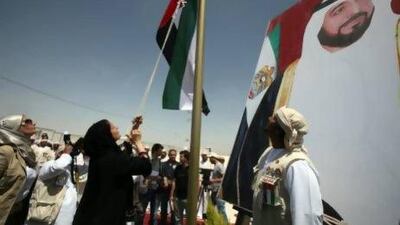HALABAT, JORDAN // Seeing his neighbours in the Syrian village of Inkhal stabbed and burnt by gangs linked to the regime was finally too much for Hael Okla.
Last month Hael, 38, took his wife and five children across the border to Jordan to the UAE-funded Emirates-Jordanian Camp. They became seven of an estimated 500,000 Syrians to seek refuge in the country.
"We're happy that we're being provided with help but we're also thankful we were able to escape with our lives," he said.
About 2,900 people last month started taking refuge in the camp, which was officially opened yesterday and can hold 5,000.
Present for the ceremony was Sheikha Lubna Al Qasimi, Minister of Development and International Cooperation, and diplomats from around the world.
Funded and administered by the UAE Red Crescent Authority (RCA), the US$10 million (Dh36.7m) camp of 770 mobile homes is in desert 80 kilometres north-east of Amman.
It focuses on families, offering aid with comforts not typically associated with refugee life.
There are seven medical centres, two schools, and pitches for football and volleyball.
Residents are delivered three meals a day, including dishes of lamb, rice and vegetables.
Everything is free of charge and offers a semblance of stability for Syrians traumatised by the war, said Mohammed Al Kaabi, deputy director of the RCA operations at the camp.
"We're doing our best to help these poor people from the terrible situation they've found themselves in," Mr Al Kaabi said. "And we're ready to continue helping."
Sarah Abdullah, 32, escaped with her four young children from a village near Damascus.
"Of course we want to go back to our homes as soon as we can because no one wants to live as a refugee," Ms Abdullah said.
"But we're happy the Emiratis are thinking of us."
Ms Abdullah said she could now rest assured that her four young children were safe from airstrikes and militia attacks. Access to clean water and nourishing meals was also a blessing.
The influx of Syrians has strained resource-poor Jordan and tested the patience of the country's 6.1 million residents who have experienced earlier inflows of Iraqi and Palestinian refugees.
But Ammar Al Hmoud, of the Steering Committee for Syrians in Jordan, a government body, said Emirati and Jordanian officials have discussed expanding the EJC to accommodate 25,000 Syrians.
"There are possibilities to replicate this project in many ways," Mr Al Hmoud said, adding the UAE camp had sought novel ways to reduce the effects on Jordanian society.
He gave the example of the camp's use of solar power and its own waste water-treatment centre.
Some aid-agency officials at the event expressed doubts about the spending priorities at EJC, saying more money could be used to address the difficult conditions at Jordan's other refugee camp for Syrians, Zaatari, homes to about 180,000 people who have to deal with crime and alleged drug use.
Angry riots erupted in Zaatari last month.
But Andrew Harper, the United Nations High Commissioner for Refugees (UNHCR) representative in Jordan, welcome the UAE-funded camp, calling it "a wonderful example of what can be achieved".
"We welcome the support and engagement from the UAE," Mr Harper said.
He said about 480,000 Syrian refugees had registered with UNHCR in Jordan, and estimated this number could approach a million by the end of the year.
Mr Harper called for more funds, saying only about half of foreign-donor pledges of $250m for the first six months of the year had been delivered.
He and others expressed concern about a sudden drop in refugees entering Jordan from Syria over past days, which has been partly attributed to regime attacks near border areas.
A western diplomat in Amman said Jordanian officials had dramatically lowered the number of refugees allowed because of security concerns, and as a protest.
"The Jordanians are worried about security issues and are sending signals to the international community highlighting the huge refugee burden they are now shouldering," the diplomat said.
The war has killed 94,000 people, the Syrian Observatory for Human Rights estimates.
* Additional reporting from Reuters

